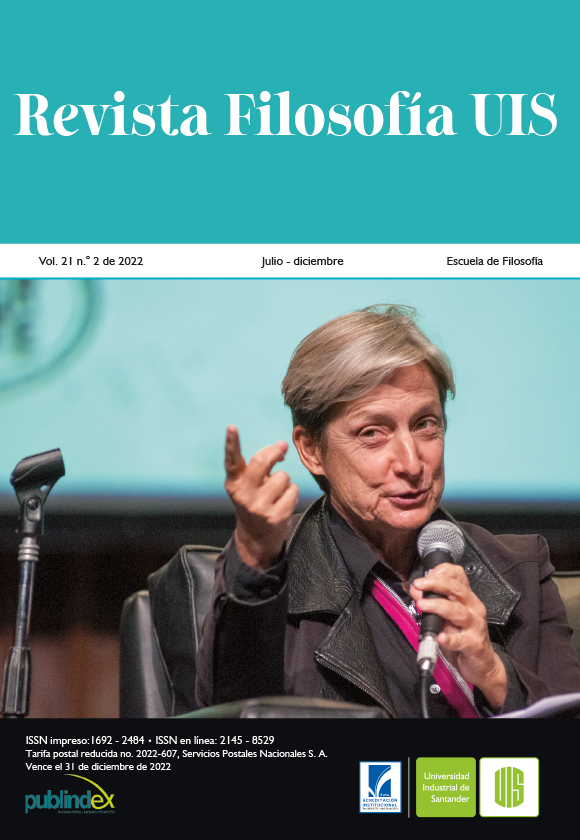Translation
Published 2022-07-01
How to Cite
Sánchez Marín, L. (2022). Translation. The Philosophical Legacy of Theodor W. Adorno. Revista Filosofía UIS, 21(2), 293–303. https://doi.org/10.18273/revfil.v21n2-2022013
Copyright (c) 2022 Revista Filosofía UIS

This work is licensed under a Creative Commons Attribution 4.0 International License.
Abstract
Translation chapter seven of Brian O'Connor Adorno's book, published by Routledge in 2013.
Downloads
Download data is not yet available.
References
- Adorno, T. W. (1974). Tres estudios sobre Hegel. Taurus Ediciones.
- Adorno, T. W. & Horkheimer, M. (1998). Dialéctica de la Ilustración. Fragmentos filosóficos. Trotta.
- Adorno, T. W. (2005a). Teoría estética. Ediciones Akal.
- Adorno, T. W. (2005b). Dialéctica negativa. La jerga de la autenticidad. Ediciones Akal. [original publicado en 1966].
- Adorno, T. W. (2008). Crítica de la cultura y sociedad I. Ediciones Akal. [original publicado en 1963].
- Adorno, T. W. (2009). Crítica de la cultura y sociedad II. Ediciones Akal. [original publicado en 1969].
- Berman, R. (2002). Adorno’s Politics. En N. Gibson y A. Rubin (Eds). Adorno: A Critical Reader (pp. 110-131). Blackwells.
- Bernstein, J. M. (2001). Adorno: Disenchantment and Ethics. Cambridge University Press.
- Connerton, P. (1976). Editor’s Introduction. En Critical Sociology (pp. 1-42). Penguin.
- Derrida, J. (2005). Paper Machine (R. Bowlby, trad.). Stanford University Press.
- Dews, P. (1995). The Limits of Disenchantment: Essays on Contemporary European Philosophy. Verso.
- Eagleton, T. (1998). Walter Benjamin. O hacia una crítica revolucionaria. Cátedra.
- Foster, R. (1999). Strategies of Justice: The Project of Philosophy in Lyotard and Habermas. Philosophy and Social Criticism, 25(2), 1-25. https://doi.org/10.1177/019145379902500205
- Habermas, J. (1993). El discurso crítico de la modernidad. Taurus.
- Habermas, J. (1994). Historia y crítica de la opinión pública. La transformación estructural de la vida pública. Editorial Gustavo Gili. [original publicado en 1962].
- Habermas, J. (1995). Perfiles filosófico-políticos. Taurus.
- Habermas, J. (1999). Teoría de la acción comunicativa. Taurus.
- Held, D. (1980). Introduction to Critical Theory: Horkheimer to Habermas. University of California Press.
- Honneth, A. (1979). Communication and Reconciliation: Habermas’ Critique of Adorno. Telos, (39). 45-61. https://doi.org/10.3817/0379039045
- Honneth, A. (2007). Reificación. Un estudio en la teoría del reconocimiento. Katz Editores.
- Honneth, A. (2009a). Crítica del poder. Fases en la reflexión de una Teoría Crítica de la sociedad. A. Machado Libros.
- Honneth, A. (2009b). Patologías de la razón. Historia y actualidad de la Teoría Crítica. Katz Editores.
- Honneth, A. (2011). La sociedad del desprecio (F. Hernández, Ed.). Trotta.
- Krahl, H.-J. (1974). The Political Contradictions in Adorno’s Critical Theory. Telos, (21), 164-167. https://doi.org/10.3817/0974021164
- Lyotard, J-F. (1974). Adorno as the Devil. Telos, (19), 127-137. https://doi.org/10.3817/0374019127
- Lyotard, J-F. (1989). The Lyotard Reader (A. Benjamin, Ed.). Blackwell.
- McCarthy, T. (1990). The Critique of Impure Reason: Foucault and the Frankfurt School. Political Theory, 18(3), 437-469. https://doi.org/10.1177/0090591790018003005
- Müller-Doohm, S. (2005). Adorno: A Biography. Polity.
- O’Connor, B. (2013). Adorno. Routledge.
- Pensky, M. (1997). The Actuality of Adorno: Critical Essays on Adorno and the Postmodern. SUNY Press.
- Specter, M. G. (2010). Habermas: An Intellectual Biography. Cambridge University Press.
- Wellmer, A. (1993). Sobre la dialéctica de modernidad y postmodernidad. La crítica de la razón después de Adorno. Visor Distribuciones.
- Wellmer, A. (1996). Finales de partida: la modernidad irreconciliable. Cátedra.
- Wellmer, A. (2007). Adorno and the Problems of a Critical Construction of the Historical Present. Critical Horizons: A Journal of Philosophy and Social Theory, 8. 135-156. https://doi.org/10.1558/crit.v8i2.135
- Wiggershaus, R. (2010). La Escuela de Fráncfort. Fondo de Cultura Económica.
